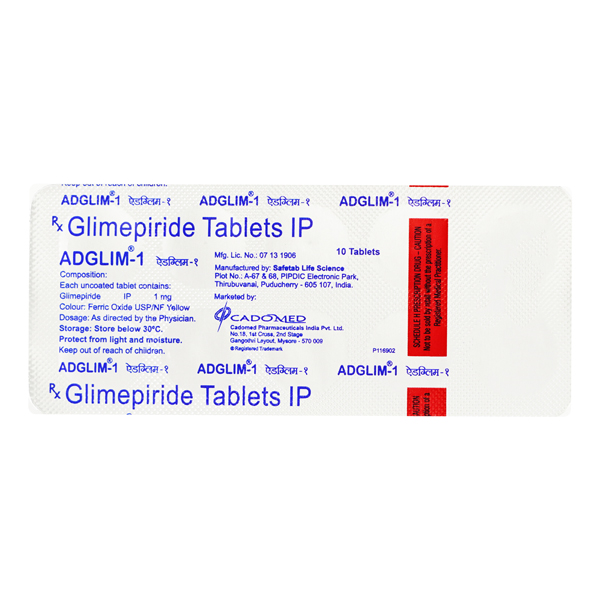ADGLIM 1MG TABLET 10S
KEY BENIFITS,
- Blood Sugar Control: The combination of Glimepiride and Metformin is often prescribed to improve glycemic control in people with type 2 diabetes.
- Insulin Sensitivity: Metformin helps the body respond better to insulin, reducing insulin resistance.
- Pancreatic Insulin Release: Glimepiride stimulates the pancreas to release insulin, which helps lower blood sugar levels.
₹36.60
CompareProduct Introduction:
ADGLIM 1MG TABLET is likely a combination medication containing two active ingredients: Glimepiride and Metformin. Glimepiride belongs to the sulfonylurea class of drugs, which helps stimulate insulin release from the pancreas. Metformin is a biguanide that improves insulin sensitivity, reduces glucose production in the liver, and decreases glucose absorption in the intestines.
ADGLIM 1MG TABLET should be taken with food. Take it regularly at the same time each day to get the most benefit. Your doctor will decide what dose is best for you and this may change from time to time according to how it is working according to your blood sugar levels.
Keep taking this medicine, even if you feel well or your blood sugar levels are controlled. If you stop it without consulting your doctor, your blood sugar levels could rise and put you at risk of kidney damage, blindness, nerve problems, and loss of limbs. Remember that it is only part of a treatment program that should also include a healthy diet, regular exercise, and weight reduction as advised by your doctor. Your lifestyle plays a big part in controlling diabetes.
The most common side effect of ADGLIM 1MG TABLET is low blood glucose levels (hypoglycemia). Make sure you recognize the signs of having low blood glucose levels, such as sweating, dizziness, headache, and shaking, and know how to deal with it. To prevent this, it’s important to have regular meals and always carry a fast-acting source of glucose such as sugary food or fruit juice with you. Drinking alcohol can also increase your risk of low blood sugar levels and should be avoided. Other side effects that may be seen on taking this medicine include taste changes, nausea, diarrhea, stomach pain, headache, and upper respiratory tract infection. Some people may find that they put on weight with this medicine.
You should not take it if you have type 1 diabetes mellitus, if you have diabetic ketoacidosis (high levels of acid in your blood), or if you have severe kidney or liver disease. Before taking this medicine, tell your doctor if you have ever had heart disease. It may not be suitable. Pregnant or breastfeeding women should also consult their doctor before taking it. Your blood sugar levels should be checked regularly and your doctor may also advise blood tests to monitor your blood cell counts and liver function.
Benefits:
- Blood Sugar Control: The combination of Glimepiride and Metformin is often prescribed to improve glycemic control in people with type 2 diabetes.
- Insulin Sensitivity: Metformin helps the body respond better to insulin, reducing insulin resistance.
- Pancreatic Insulin Release: Glimepiride stimulates the pancreas to release insulin, which helps lower blood sugar levels.
Side Effects:
Common side effects may include nausea, diarrhea, abdominal discomfort, hypoglycemia (low blood sugar) when used with Glimepiride, and other gastrointestinal symptoms. It’s important to be aware of potential side effects and report any unusual reactions to your healthcare provider.
Usage Guidelines:
Dosage and administration guidelines should be followed as prescribed by your healthcare provider. The dosage may vary depending on individual health conditions and needs. Typically, these tablets are taken with meals to maximize their effectiveness and minimize side effects.
Drug Interactions:
It’s crucial to inform your healthcare provider about all medications and supplements you are taking to avoid potential interactions. Glimepiride and Metformin can interact with other medications, affecting their efficacy or increasing the risk of side effects. Some interactions may occur with certain antibiotics, antifungal medications, and drugs affecting renal function. Your healthcare provider will consider these factors when prescribing ADGLIM 1MG TABLET.
Always consult with your healthcare professional for personalized advice, as they can provide specific guidance based on your health status and any potential interactions with other medications you may be taking.
SAFETY ADVICE

Alcohol

Pregnancy

Breast feeding

Driving

Kidney
Use of ADGLIM 1MG TABLET is, however, not recommended in patients with severe kidney disease. Regular monitoring of kidney function test is advisable while you are taking this medicine.

Liver
ADGLIM 1MG TABLET is generally started with low dose in patients with mild to moderate liver disease and its use is not recommended in patients with severe liver disease.
| Weight | 0.5 kg |
|---|---|
| Dimensions | 10 × 10 × 10 cm |


